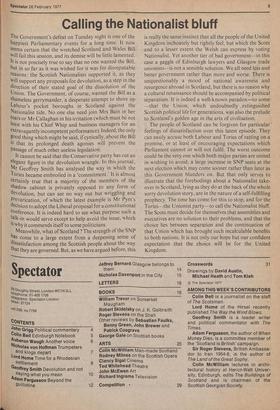Calling the Nationalist bluff
The Government's defeat on Tuesday night is one of the happiest Parliamentary events for a long time. It now seems certain that the wretched Scotland and Wales Bill Will fail this session, and its demise will be little lamented. It is not precisely true to say that no one wanted the Bill, but in so far as it was wished for it was for disreputable reasons : the Scottish Nationalists supported it, as they Will support any proposals for devolution, as a step in the direction of their stated goal of the dissolution of the Union. The Government, of course, wanted the Bill as a shameless gerrymander, a desperate attempt to shore up Labour's pocket boroughs in Scotland against the Nationalist tide. No one else need join Mrs Bain in her tears or Mr Callaghan in his irritation (which must be not least with his Chief Whip and business managers for an extravagantly incompetent performance). Indeed, the only pod thing which might be said, if cynically, about the Bill is that its prolonged death agonies will prevent the Passage of much other useless legislation.
It cannot be said that the Conservative party has cut an elegant figure in the devolution wrangle. In this journal, Mr Geoffrey Smith has analysed the way in which the Tories became embroiled in a 'commitment.' It is almost certainly true that a majority of the members of the Shadow cabinet is privately opposed to any form of devolution, but can see no way out but wriggling and Prevarication, of which the latest example is Mr Pym's decision to adopt the Liberal propoSal for a constitutional conference. It is indeed hard to see what purpose such a !alk-in would serve except to help avoid the issue, which is why it commends itself to some politicians.
Meanwhile, what of Scotland ? The strength of the SNP 1.1.s come to a large extent from a deepening sense of dissatisfaction among the Scottish people about the way that they are governed. But, as we have argued before, this is really the same instinct that all the people of the United Kingdom inchoately but rightly feel, but which the Scots and to a lesser extent the Welsh can express by voting Nationalist. Yet another tier of bad government—in this case a gaggle of Edinburgh lawyers and Glasgow trade unionists—is not a sensible solution. We all need less and better government rather than more and worse. There is unquestionably a mood of national awareness and resurgence abroad in Scotland, but there is no reason why a cultural renaissance should be accompanied by political separatism. It' is indeed a well-known paradox—to some —that the Union, which undoubtedly , extinguished Scottish political life for generations, was also the prelude to Scotland's golden age in the arts of civilisation.
The people of Scotland can be forgiven for particular' feelings of dissatisfaction over this latest episode. They can easily accuse both Labour and Tories of ratting on a' promise, or at least of encouraging expectations which Parliament cannot or will not fulfil. The worst outcome could be the very one which both major parties are united in wishing to avoid, a large increase in SNP seats at the next election which may come sooner rather than later as this Government blunders on. But that only serves to illustrate that the forebodings about a Nationalist takeover in Scotland, lying as they do at the back of the whole sorry devolution story, are in the nature of a self-fulfilling prophecy. The time has come for this to stop, and for the Tories—the Unionist party—to call the Nationalist bluff. The Scots must decide for themselves that assemblies and executives are no solution to their problems, and that the choice lies between separation and the continuation of that Union which has brought such incalculable benefits to both nations. It is not only our hope but our confident expectation that the choice will be for the United Kingdom.


































 Previous page
Previous page